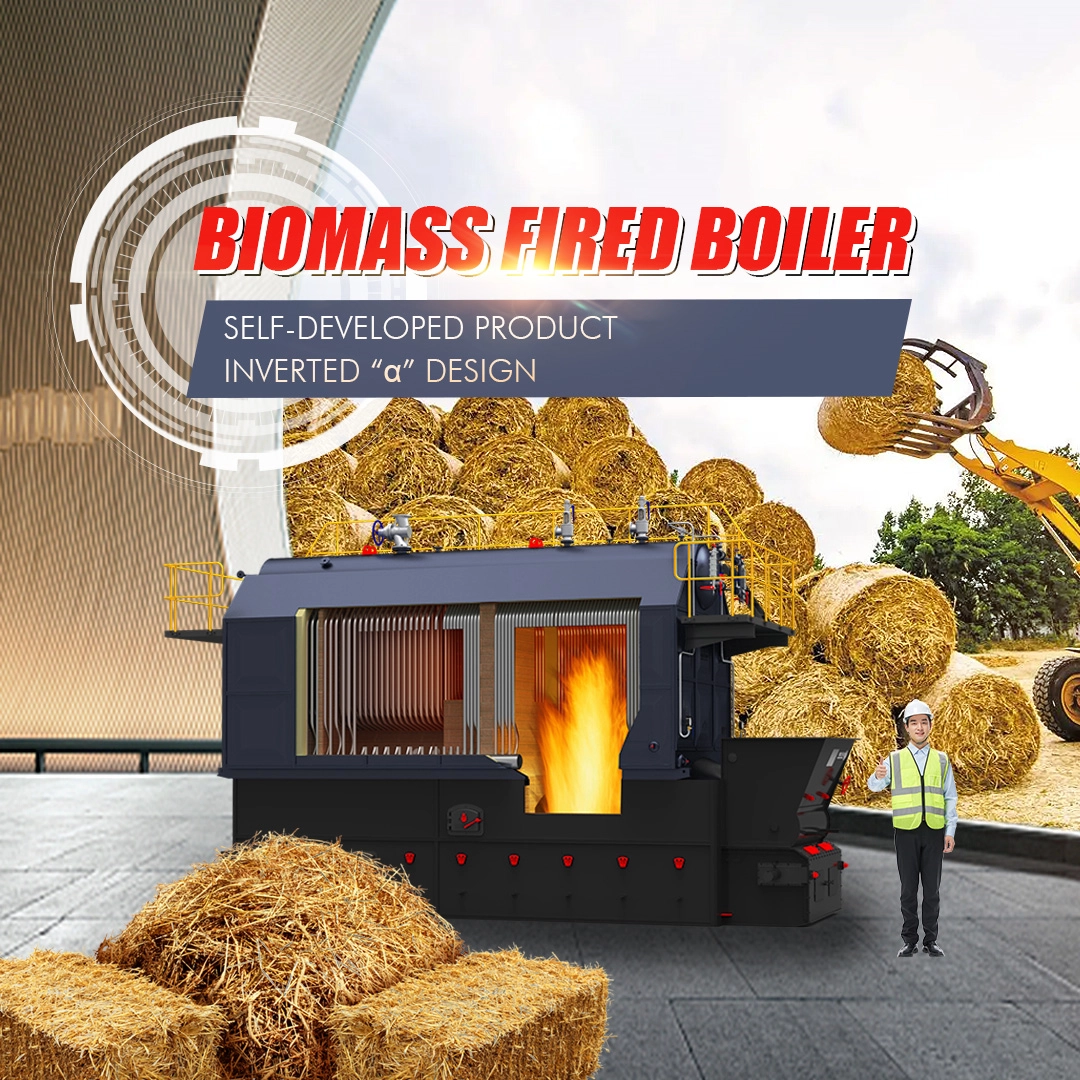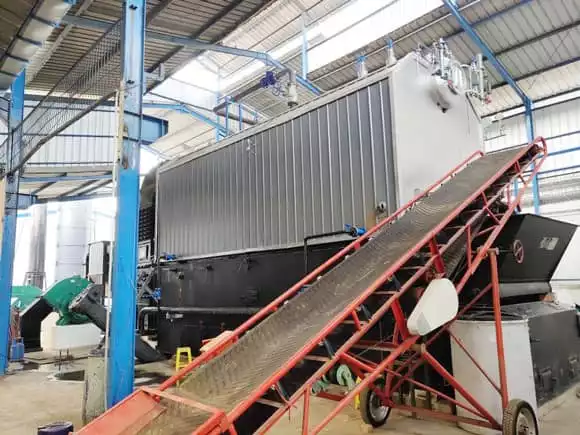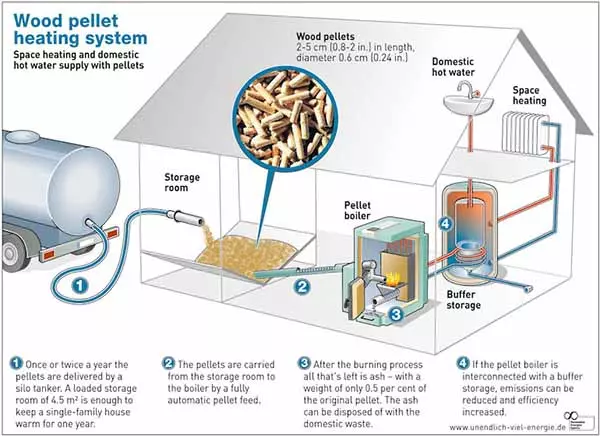
生物质燃料正成为越来越受欢迎的可再生能源,因为它环保且碳足迹低. 生物质燃料供给系统用于将生物质燃料从储存筒仓输送至锅炉燃烧. 在这个博客中, 我们将讨论生物质燃料供给系统的主要组成部分及其工作原理.
A 生物质锅炉系统, 从技术角度来说, 是一种利用生物质作为可再生能源来产生热量的供暖系统. 生物质是指有机材料, 例如木颗粒, 农业废弃物, 或专用能源作物, 在锅炉系统中用作燃料.
FANGKUAI, 作为锅炉技术的全球领导者, 在开发高效、环保的创新生物质锅炉系统方面取得了重大进展. 我们的生物质锅炉配备先进的燃烧技术,确保生物质最佳转化为热能, 最大限度地减少有害排放并最大限度地提高能源效率.
公司使用燃料储存筒仓来储存散装生物质燃料供应. 这些筒仓有各种尺寸, 由混凝土建造, 钢, 或铝, 根据具体要求定制. 取决于应用, 筒仓可以位于室内或室外.
燃料喂料螺旋钻在将生物质燃料从储存筒仓运输到锅炉炉排进行燃烧方面发挥着至关重要的作用. 螺旋钻利用螺旋机构将燃料通过管道或通道推向锅炉.
燃料分配器确保燃料均匀分布在锅炉炉排上. 这可能涉及在炉排上移动的旋转臂,以实现均匀的燃料分布, 或者可以采用固定分配系统.
能源生产从燃料炉排开始, 生物质燃料燃烧的地方. 炉排的设计根据燃烧的具体燃料类型而变化.
生物质燃料供给系统通过控制系统有效运行和监控. 该系统可以结合自动控制装置,根据锅炉的负载调节燃料流量.

与传统化石燃料系统相比,生物质燃料供给系统具有多种优势:
为生物质锅炉提供燃料, 可以采用多种方法. 一种常见的方法是使用燃料储存和处理系统. 该系统通常包括燃料储存筒仓或容器等组件, 用于运输燃料的输送机或螺旋钻, 以及将燃料卸载和送入锅炉的设备.
燃料储存和处理系统的具体设计和配置可能会根据所使用的生物质燃料的类型和特性而变化. 例如, 与农业废物或专用能源作物相比,木颗粒可能需要不同的处理系统.
炉排锅炉在生物质燃烧中得到广泛应用,并具有适应多种燃料类型的能力, 包括木质燃料, 煤炭, 废燃料, 泥炭, 甚至稻草. 在这些锅炉内, 炉排装置成为焦点, 促进燃料进入炉排. 这种运动可以通过可调节的门或控制位于门下方的燃料运动速度来控制. 当燃料穿过炉排时, 发生燃烧, 产生热量为锅炉提供动力.

生物质锅炉过程由一系列不同的阶段组成. 首先, 生物质燃料, 包含木颗粒或农业废物等材料, 最初储存在专用燃料储存筒仓或容器中. 继此, 使用输送机或螺旋钻将燃料有效地输送到锅炉, 简化流程并确保稳定的燃料供应.
锅炉内部, 生物质燃料燃烧, 从而释放热能. 然后利用这些热量通过蒸汽-水系统将水转化为蒸汽. 该过程从水加热开始, 随后蒸发, 并最终过热, 全部由燃烧产生的能量提供动力. 重要部件包括管子, 管道, 阀门, 以及多样化的配件.
产生的蒸汽有多种用途, 包括建筑供暖, 水加热, 甚至通过蒸汽轮机发电. 此外, 特定的生物质锅炉可以采用热化学技术来制造液体或气体燃料,例如可再生柴油, 甲烷, 甚至可再生航空燃料.
现在, 让我们开始设计与您的锅炉设置无缝集成的生物质燃料供给系统的旅程. 此过程的基石是确定您的燃料存储要求和容量. 准确的计算可防止燃料供应中断并保证系统的可靠性.
燃料处理设备在该系统中发挥着关键作用. 从确保一致进料速率的螺旋输送机到配备防止桥接的搅拌器的料斗, 您的选择会影响整体效率. 根据您的需求定制您的选择, 无论是精确输送还是防止燃油堵塞.
该系统的核心在于燃油输送机制, 维持锅炉连续运行的关键因素. 将其视为一首交响乐 - 传送系统精确地编排每个音符,完美和谐, 确保无缝性能.
设计到位后, 是时候让您的生物质燃料供给系统投入使用了. 适当的场地准备至关重要, 保护您的设备免受自然因素的影响,确保操作员和设备的安全. 大自然是不可预测的, 但准备充分的场地可以经受住任何风暴.
安装过程涉及配置燃料储存和处理设备. 这一步需要注意细节——每一个连接, 每个设置都很重要. 组件必须协同工作, 就像拼图的各个部分拼凑在一起形成一幅大图.
将燃料输送系统连接到锅炉是关键时刻. 兼容性是这里的关键, 确保给水系统与锅炉无缝集成. 当你建立这些联系时, 想象能量流——燃料和锅炉之间的连续舞蹈, 精心设计以实现最佳效率.
生物质燃料供给系统是任何生物质锅炉系统的重要组成部分. 它们可以高效、可靠地将生物质燃料从储存转移到锅炉进行燃烧. 生物质燃料系统的优点使其成为传统化石燃料系统的有吸引力的替代品. 随着对可再生能源的需求不断增加, 生物质燃料系统将继续普及并成为工业领域更常见的景象, 商业的, 和住宅环境.
免费锅炉报价
没有延迟, 得到 3 今日报价 比较最优惠的价格 安全可靠评论
本文内容?
V查看我们客户的评论
"方快导热油锅炉操作维护非常方便. 它帮助我们节省了维护时间和金钱, 这导致显着的成本节约. 材料的质量和锅炉的构造非常出色. 它也非常节能, 这帮助我们节省了能源费用. 强烈推荐方快的导热油锅炉 ."
艾伦
巴西"方快的热水器太棒了. 升温快速高效, 而且水会长时间保持高温. 我们从来没有遇到过任何问题,它在我们的日常运营中取得了显着改善. 安装过程也很顺利,客服态度也很好. 强烈推荐方快的热水器。"
莎拉
加拿大"我们化工厂一直在使用方快导热油锅炉多年,从未让我们失望过. 锅炉非常耐用,可以承受恶劣的条件. 它也非常容易操作和维护, 这帮助我们节省了维护时间和金钱. 方快的导热油锅炉是一流的,我强烈推荐给任何需要可靠供暖解决方案的人。"
张
中国"我们化工厂一直在使用方快导热油锅炉多年,从未让我们失望过. 锅炉非常耐用,可以承受恶劣的条件. 它也非常容易操作和维护, 这帮助我们节省了维护时间和金钱. 方快的导热油锅炉是一流的,我强烈推荐给任何需要可靠供暖解决方案的人。"
张
中国"方快的热水器太棒了. 升温快速高效, 而且水会长时间保持高温. 我们从来没有遇到过任何问题,它在我们的日常运营中取得了显着改善. 安装过程也很顺利,客服态度也很好. 强烈推荐方快的热水器。"
莎拉
加拿大"我为我的工厂购买了一台方快蒸汽锅炉,它已经完美运行了几个月了. 材料的质量和锅炉的结构令人印象深刻. 它也非常节能, 这帮助我们节省了能源费用. 我向任何需要可靠高效供暖解决方案的人强烈推荐方快的产品。"
约翰
美国"方快导热油锅炉操作维护非常方便. 它帮助我们节省了维护时间和金钱, 这导致显着的成本节约. 材料的质量和锅炉的构造非常出色. 它也非常节能, 这帮助我们节省了能源费用. 强烈推荐方快的导热油锅炉 ."
艾伦
巴西"方快的蒸汽锅炉非常适合我的食品加工业务. 它满足我们的所有要求并且非常可靠. 材料的质量和锅炉的构造非常出色. 它也非常容易操作和维护, 这帮助我们节省了维护时间和金钱. 我向任何需要可靠供暖解决方案的人强烈推荐方快的蒸汽锅炉。"
杰森
巴西"方快的蒸汽发生器非常适合我的小生意. 它非常易于使用,需要最少的维护. 它也非常节能, 这帮助我节省了能源费用. 方快的客服也很好. 他们反应灵敏,乐于助人. 强烈推荐方快的蒸汽发生器。"
艾哈迈德
埃及